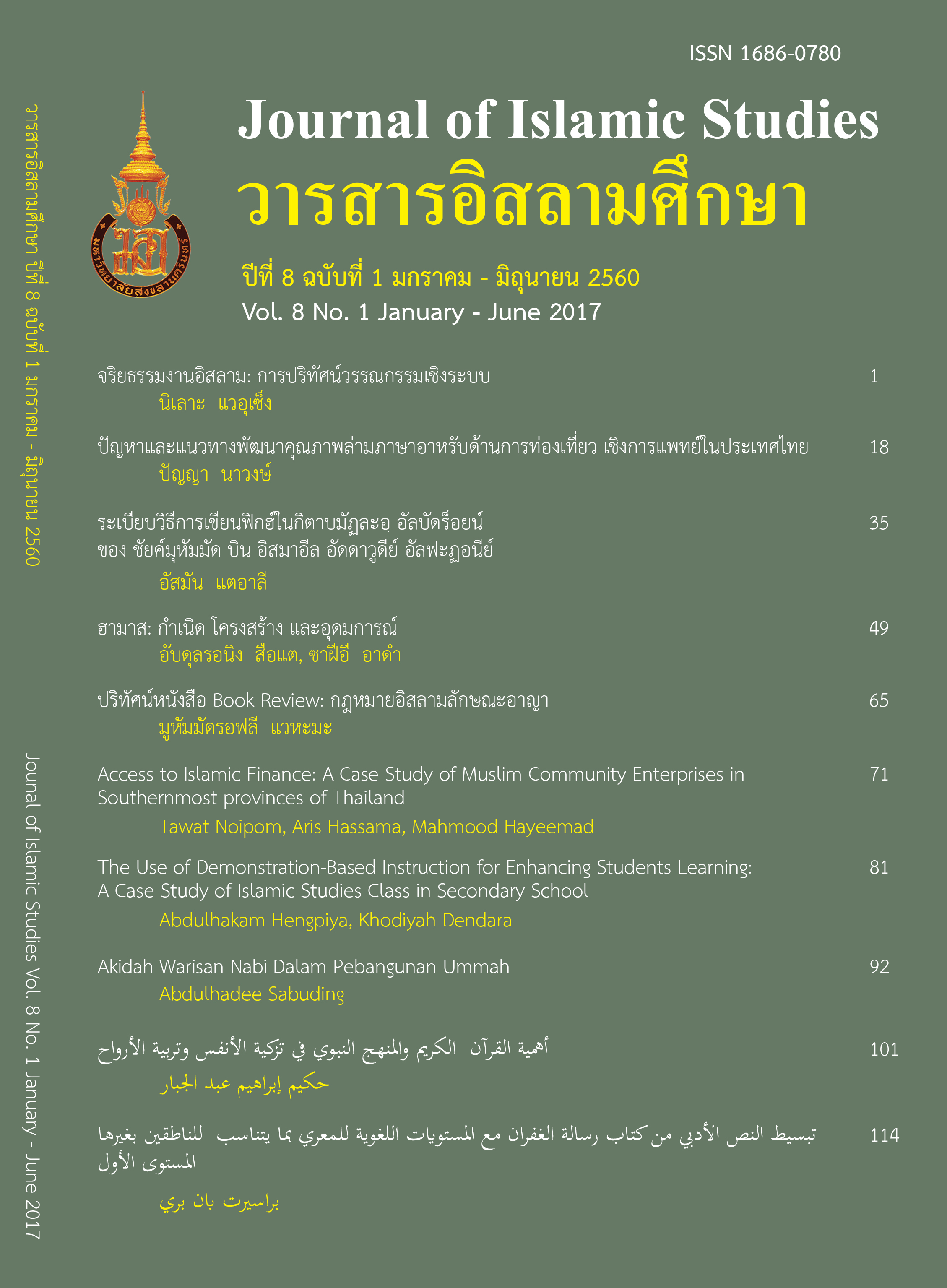Islamic Work Ethics: A Systematic Literature Review
Abstract
Work cannot be successful and beneficial to others unless those involved in it uphold work ethics. From Islamic point of view, quality of work has direct link to work ethics which is derived from Qur’an and Sunnah of the Prophet (Peace be upon him). Indeed, work is part of worship (Ibadah) to Allah. However, there are handful numbers of researches examining the concept of Islamic work ethics (IWE) as well as its implications. This is because most works are done within western context. A systematic review of the present study reveals multi-dimensional concept of IWE which centered on religious values apart from its various uses. Related works on IWE were collected from online database and analysed by using matric table with reported frequencies. Suggestions were proposed for further construction of conceptual framework in the future.
References
Ali, Abbas J. & Al-Kazemi, Ali A. (2007). Islamic work ethic in Kuwait. Cross Cultural Management: An International Journal, 14(2), 93-104.
Ali, Abbas, Falcone, T. & Azim, A. (1995). Work ethic in the USA and Canada. Journal of Management Development, 14(6), 26-34.
Ali, Abbas. (1988). Scaling an Islamic work ethic. Journal of Social Psychology, 128(5), 575-583.
Ali, Abbas. (1992). The Islamic Work Ethic in Arabia. Journal of Psychology, 126(5), 507-519.
Amilin AMILIN. (2016). Could Islamic Work Ethics Reduce the Work Stress of Accountants and Minimize Their Intention to Quit?. International Journal of Economic Perspectives, 10(2), 134-145.
Azharsyah Ibrahim & Nor ‘Azzah Kamri. (2016). The commitment to Islamic work ethics among Islamic banking employers in ACEH. Jurnal Syariah, 24(1), 93-114.
Khan, Khurram, Abbas, Muhammad, Gul, Asma & Raja, Usman. (2015). Organizational Justice and Job Outcomes: Moderating Role of Islamic Work Ethic. J Bus Ethics, 126, 235–246. DOI 10.1007/s10551-013-1937-2
Mursaleen, Muhammad, Saqib, Lutfullah, Roberts, K. W., & Asif, Muhammad. (2015). Islamic work ethics as mediator between trust and knowledge sharing relationship, Pak J Commer Soc Sci, 9 (2), 614-640.
Murtaza, Ghulam, Abbas, Muhammad, Raja, Usman, Roques, Olivier, Khalid, Afsheen, & Mushtaq, Rizwan. (2016). Impact of Islamic Work Ethics on Organizational Citizenship Behaviors and Knowledge-Sharing Behaviors. J Bus Ethics, 133, 325–333. DOI 10.1007/s10551-014-2396-0
Naresh Kumar & Raduan Che Rose. (2010). Examining the link between Islamic work ethic and innovation capability. Journal of Management Development, 29(1), 79-93.
Norlela Kamaluddin & Siti Khadijah Ab. Manan. (2010). The conceptual framework of Islamic Work Ethic (IWE). Malaysian Accounting Review, 9(2), 57-70.
Sarwar, Shagufta & Abugre, J. B. (2013). An assessment of Islamic work ethics of employees in organizations: Insights from the United Arab Emirates. Problems of Management in the 21 century, 6, 60-72
Sidani, Yusuf & Al Ariss, Akram (2015). New Conceptual Foundations for Islamic Business Ethics: The Contributions of Abu-Hamid Al-Ghazali. J Bus Ethics, 129, 847–857. DOI 10.1007/s10551-014-2136-5
Wahibur Rokhman & Arif Hassan. (2012). The effect of Islamic work ethic on organizational justice. African Journal of Business Ethics, 6(1), 25-29.
Windle, P. E. (2010). The systematic review process: an overview. Journal of Perianesthesia Nursing: Official Journal of the American Society of PeriAnesthesia Nurses/ American Society of PeriAnesthesia Nurses, 25(1), 40–42. doi:10.1016/j.jopan. 2009.12.001.
Yousef, D. A. (2000). The Islamic work ethic as a mediator of the relationship between locus of control, role conflict and role ambiguity: A study in an Islamic country setting. Journal of Managerial Psychology 15, 283–302.
Yousef, D. A. (2001). Islamic work ethic: A moderator between organizational commitment and job satisfaction in a cross-cultural context. Personnel Review 30, 152–169.
Downloads
Published
How to Cite
Issue
Section
License
Copyright (c) 2019 Journal of Islamic Studies, Prince of Songkla University, Pattani Campus

This work is licensed under a Creative Commons Attribution 4.0 International License.
All articles Published in The Journal of Islamic Studies are author’s opinions, and not the responsibility of the Faculty of Islamic Sciences nor the editorial board. However any citation should be referred to the journal.
















